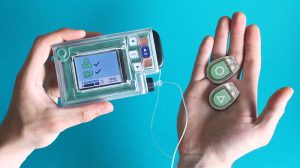
Netherlands-Originated Artificial Pancreas Enhances Quality of Life for Type 1 Diabetes Patients, According to The Lancet Study
A recent study published in The Lancet reveals that an artificial pancreas developed in the Netherlands, known as the Inreda AP, can significantly improve the management of blood sugar levels in type 1 diabetes patients. Invented by Dutch engineer Robin Koops over 15 years ago, the device, a compact portable pump, administers both insulin and glucagon to stabilize blood sugar levels.
The study, self-financed by Koops’ company Inreda Diabetic, involved 75 participants who used the Inreda AP for a year. Results showed that blood sugar levels remained constant for an average of six hours longer, and participants reported fewer symptoms associated with type 1 diabetes, such as impaired vision. Notably, the device differentiates itself by administering both insulin and glucagon.
Diabetes expert Hanno Pijl, while acknowledging the trial’s randomization, pointed out the absence of a control group and suggested the potential influence of the placebo effect. Nevertheless, Pijl expressed confidence in the device’s positive impact on blood sugar control.
Despite the promising results, some users found discomfort with the apparatus, as reported by endocrinologist and trial researcher Arianne van Bon. Approximately 10 to 15% of participants faced challenges relinquishing control, citing concerns about the device’s appearance and reliance.
For individuals with type 1 diabetes, the absence of insulin production poses severe health risks, including blindness, kidney failure, and heart failure. Participants in the trial expressed significant improvements in their daily lives, with one participant noting the freedom to change jobs and another reporting enhanced eyesight.
Robin Koops, who is himself a type 1 diabetes sufferer, highlighted personal improvements in his sight, and a subsequent non-randomized trial planned for September aims to validate these findings.
Charity Diabetes Fonds, actively involved in the device’s development, emphasized the potential of the artificial pancreas to enhance people’s quality of life. Koops is optimistic that the positive outcomes will encourage health insurers to include the Inreda AP in their healthcare packages, as currently, only a limited group has access through insurers Menzis and CZ. A more extensive trial by UMC Utrecht and 12 other hospitals, initiated in 2022, could pave the way for inclusion in the basic health package by 2026, according to trial researcher Arianne van Bon.
